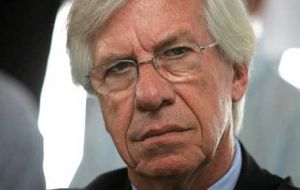MercoPress. South Atlantic News Agency
Uruguay’s main problem is high inflation but no policy changes planned, says Astori
 The Uruguayan Vice-president blamed ‘extraordinary factors’ in 2012
The Uruguayan Vice-president blamed ‘extraordinary factors’ in 2012 Uruguay's main economic problem is high inflation, and policymakers will continue to use interest rates and bank reserve requirements to bring it under control, Vice President Danilo Astori said on Tuesday. Consumer prices in Uruguay rose 8.14% in the 12 months through April, far outside the country's official annual target range of 4 to 6%.
“It is the main macroeconomic problem of Uruguay,” Astori said at an economic forum. “But we cannot be distracted at all, we have to keep the target range between 4 and 6%, and that's what we're doing”
The Uruguayan economy grew 3.9% in 2012 after rising 6.5% in 2011. Despite slower growth, consumer prices remain stubbornly high and a concern for policymakers.
The central bank raised its benchmark interest rate by 25 basis points to 9.25% in December and then held it there in March, when it raised marginal reserve requirements on local and foreign currency deposits.
Banks in the country have to abide by a marginal reserve requirement of 25% for deposits in Uruguayan pesos, up from an earlier 20%. The requirement for foreign currency rose at the start of April to 45% from 40%.
“We do not have any planned policy changes on the table, but we will be monitoring developments,” Astori said. “We trust in the sustainability of the measures we are taking and believe they will give positive results over time.”
Uruguay's marginal reserve requirements refer to the growth of deposits since April 2011, when the central bank introduced the scheme to expand its monetary policy tools.
Astori however admitted that the budget deficit of 2.3% of GDP with a growing economy was well over the 1.4% originally programmed but blamed it on “extraordinary factors’.
Among the extraordinary factors Astori mentioned the over-costs of energy last year because of severe drought conditions, the financial cost of buying the massive influx of dollars attracted by Uruguay’s high rates and paying creditors of a liquidated bank during the financial crisis of 2002, ‘a considerable sum’.
“The deficit can be serious but I do not consider it as such. This problem can’t be analyzed independently from the great financial leeway that the country currently has”, said Astori.
“We have to be cautious, act with prudence but the country has sufficient margin so that its fiscal situation can be sustainable”, he added. Nevertheless he admitted the country must make an effort to control government expenditure.
As to the threats posed by the massive influx of short term capital, Astori brushed aside negative effects for the local foreign exchange market, although admitting that the Central bank has invested (in buying dollars) in four months more than in the twelve months of 2012.
“There are concerns regarding the whole macroeconomic policy but we are satisfied with the results so far”, insisted the Vice-president.
In recent statements the Uruguayan Central bank president Mario Bergara said that faced with the option of slowing growth or having some inflation, the government prefers to have an economy with plenty of jobs and strong domestic demand.




Top Comments
Disclaimer & comment rules-

-

-

Read all commentsNo! Uruguays main problem is that it has an Ar*ehole for a neighbour.
May 22nd, 2013 - 07:25 am 0Great vision thing from the rightist Astori - main problem is inflation but no changes planned to deal with it! Imagine if Cristina said something like that, what would be the response here!
May 22nd, 2013 - 10:13 am 0@2 there would be no response here as the Nazi queen would not admit such a failing in the first place.
May 22nd, 2013 - 10:17 am 0Commenting for this story is now closed.
If you have a Facebook account, become a fan and comment on our Facebook Page!